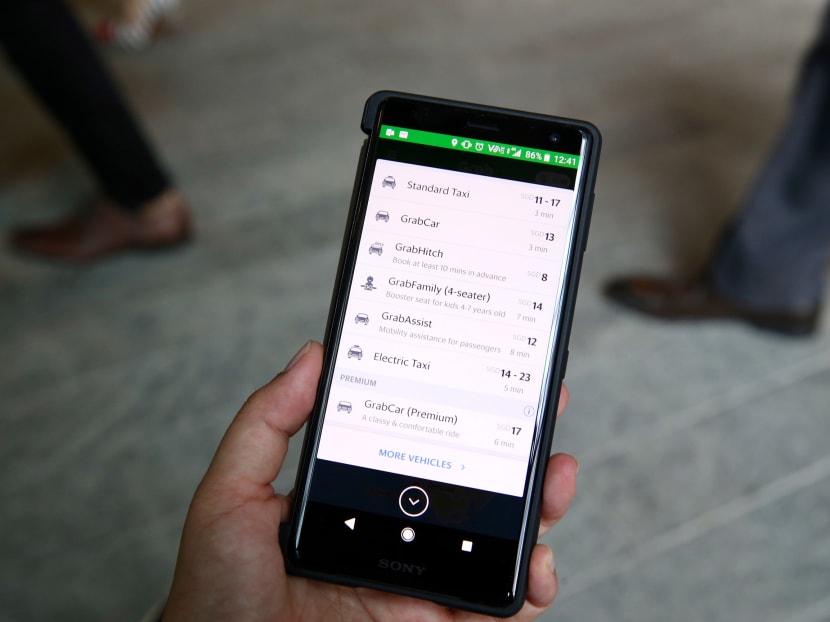Youth conspired with 16 people to cheat GrabHitch of S$26,000 through bogus bookings
SINGAPORE — Over two months last year, Ryan Wong Wei Zhi and his childhood friend recruited more than a dozen other people to scam ride-hailing firm Grab.

Grab was tricked into believing that 1,758 of the fraudulent ride bookings were genuine and paid out S$26,115 to Ryan Wong Wei Zhi and Chua Wei Beng.
- Ryan Wong Wei Zhi asked his friend to join him in a scam to make money off GrabHitch
- They rounded up several individuals who used 24 riders’ accounts and 13 drivers’ accounts to carry out the scheme
- While investigations were ongoing, they discussed if they could scam Go-Jek as well
SINGAPORE — Over two months last year, Ryan Wong Wei Zhi and his childhood friend recruited more than a dozen other people to scam ride-hailing firm Grab.
Wong had discovered a weakness in the booking and payment system on the mobile application, such that he could book rides with social carpooling service GrabHitch using a debit card linked to an empty bank account.
That led to Grab paying drivers for completed “rides” that were really just riders’ and drivers’ accounts set up by Wong for the purpose of the scam.
He managed to cheat Grab of S$26,115 before the firm discovered what was happening.
On Tuesday (June 23), Wong, now aged 20, pleaded guilty to a single charge of conspiring to cheat GrabTaxi Holdings, which owns the GrabHitch service.
Another similar charge will be taken into consideration for sentencing next week.
Senior District Judge Ong Hian Sun called for reports to assess if Wong is suitable for probation or reformative training.
The latter — a regimented rehabilitation programme for offenders under the age of 21 who commit relatively serious crimes — is a harsher punishment than probation, which allows young offenders to continue with their education or employment while serving their sentences.
The punishment for cheating is typically up to 10 years’ jail and a fine.
Along with Wong, two others were charged for their roles in the scheme — his childhood friend Chua Wei Beng and full-time national serviceman Kenneth Ho Hong Wei, whom Wong met while they were both stationed at Selarang Camp.
Their cases are still pending. At the time of the offences, Wong was also serving his National Service.
HOW THE SCAM WORKED
The court heard that around January 2019, Wong realised that he could make mine Grab’s booking system to make money dishonestly.
When Grab charged a rider’s debit card that had no money in the account, Grab would not get the payment but it would still pay the driver who completed the ride his earnings, which went into the driver’s account.
In early February 2019, Wong asked Chua to join in the scheme. Chua allegedly agreed and offered his driver’s account, after which they agreed to split their profits equally.
However, they soon realised that it was not profitable enough. Each driver could make just two trips a day and earn a maximum of S$144 daily.
Chua then allegedly invited Ho to take part in their plan. Ho was to recruit more participants and get S$300 every week for that.
The trio then recruited another 14 people, including Wong’s girlfriend, by April 2019. They were typically promised weekly commissions of S$300 to S$400.
In total, Wong and Chua controlled 24 riders’ accounts and eight drivers’ accounts. The other participants controlled another five drivers’ accounts.
Deputy Public Prosecutor (DPP) Phoebe Leau said that between March and April last year, Wong and Chua made a total of 2,321 fraudulent ride bookings.
Grab was tricked into believing that 1,758 of them were genuine and paid out S$26,115. Wong and Chua split most of the sum equally between them.
The bookings were all under the names of seven fictitious passengers and for the same routes.
Wong applied for five debit cards, linked them to his bank account — which had insufficient funds at the time — and used them to make the bookings.
Around March 30 last year, Grab discovered the fraudulent rides and deactivated the 13 drivers’ accounts.
When investigations were ongoing in May that year, Wong, Chua and Ho met to discuss if they could execute a similar scam on ride-hailing firm Go-Jek’s app.
However, their plans were dashed a few days later when police officers from the Commercial Affairs Department called them in for questioning.
Wong has not made restitution to Grab.
‘FAIRLY ELABORATE’ SCAM
DPP Leau described the scam as “fairly elaborate” and that Wong had essentially masterminded it. There was also a high degree of planning and deliberation involved, she added.
His lawyer, Mr CK Teo, said in mitigation that his client came from a “rather disadvantaged family” and that he was “always thinking of ways to earn extra income” beyond his National Service allowance of S$500.
“He saw that the vulnerability of the Grab system could be exploited and one thing led to another. He was resourceful but unfortunately, this led him down a wrong path,” Mr Teo added.
As for the plan to cheat Go-Jek, Mr Teo said that it was a “blessing in disguise” that police officers came into the picture at that point.
“He’s young, intelligent, resourceful and capable of reform. With the proper guidance and element of discipline, all these worthy values could be put to better use,” the lawyer argued.











